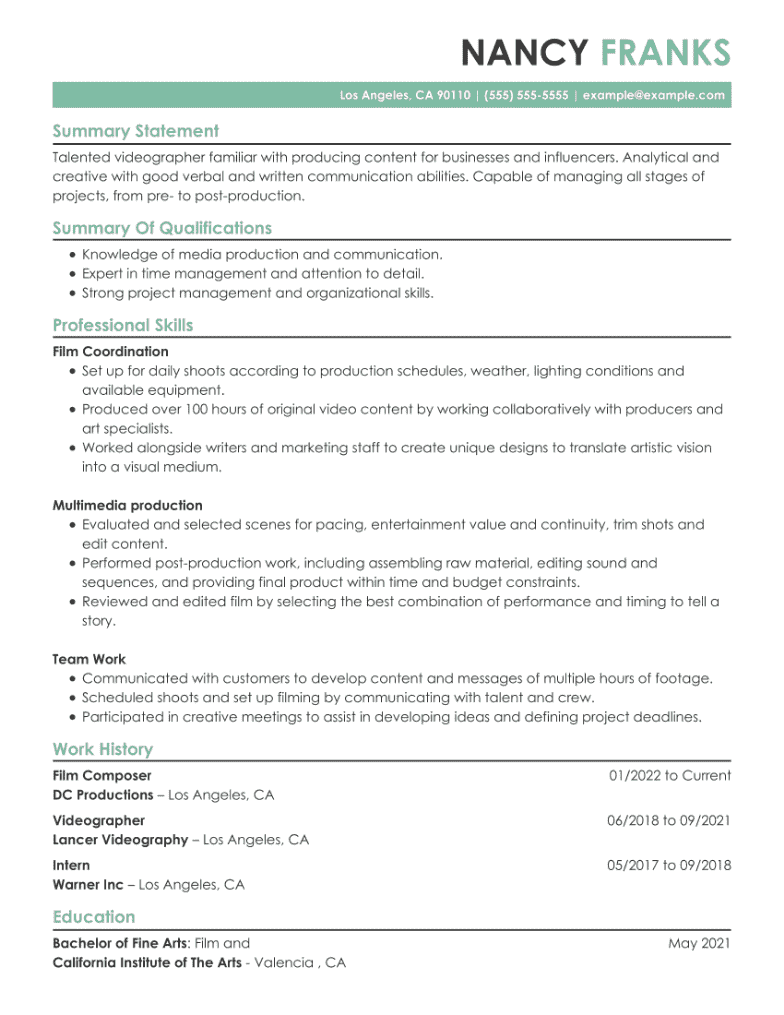Stunning film CV example for this year
Looking for a job in film production? Use these industry-specific tips and resume examples to write the perfect film CV!
Looking for a job in film production? Use these industry-specific tips and resume examples to write the perfect film CV!





OUR USERS HAVE BEEN HIRED BY

CV writing, just like film production, is all about storytelling. To land a job in the competitive film industry, you’ll have to put on a powerful performance that wins the admiration of your audience – in your professional CV.
Writing a CV is your first chance to make a good impression and show that you can play a leading role in the employer’s future successes. With our tips, examples, and intuitive CV Builder tool, you’ll be well on your way to stardom in no time.
This guide will show you:
As with the films you work on, there will be many moving parts to your CV. What you choose to include on your CV will vary depending on the role you apply to. A casting director, for example, will need to demonstrate a different set of skills compared to a film director.
Once you’ve pinpointed the role to which you’re applying, you can begin to look through the job description and tailor your CV accordingly. Hiring managers will be most interested in your previous work experience and film credits, as these sections give insight of where your talents lie.
If you’re applying to a video production, photography, or editing role, then you’ll also have to showcase your technical skills. Proficiency in a range of video editing tools may be an essential requirement in these cases.
The structure of a film CV will vary slightly from the traditional CV format. This is because you should include a ‘film credits’ or ‘selected projects’ section to accompany the traditional CV sections.
You have a choice of three CV formats for your CV:
While we usually recommend the chronological format, depending on your mix of skills and professional experience, you may find a functional or combination format is better for you. The CV sample below uses the combination format.
Insert your contact details in the CV header at the top of the page. This includes:
Present this information clearly so that the recruiter can easily contact you should they wish to progress your application.
The professional summary (or career objective) is an important part of your film CV. This section serves as a brief overview of the skills and experiences that best qualify you for the role.
A professional summary covers your key qualities and achievements. A career objective is similar but also states your career aspirations. If you already have several years of experience in film production, then a professional summary will work best.
You may decide to change the traditional skills section of your CV to a qualifications section when applying to film roles. The qualifications section serves a similar purpose: to showcase your key areas of expertise within film production. Place less emphasis on soft skills here; the hiring manager will want to gauge your competence with role-specific hard skills. These include:
Tailor your CV skills to the role. To do this, read through the job description and include any of the desirable skills that you possess on your CV.
If you have previous industry experience, then add a section that lists some of the projects you’ve worked on. Rather than list all of your film credits, cherry-pick three to five projects that will be of greatest interest to the hiring manager. For each project, include the film name and your job title.
Use the work experience section to describe in greater detail your previous roles in film. For each position, list in bullet points the tasks and responsibilities that are most relevant to the role you’re applying to. Exclude any jobs not related to film production.
If you have a relevant master’s or bachelor’s degree in film production or another related field, then you should include this in the education section at the bottom of your CV. List only your highest level of education here. You may also include relevant certifications.
Whether you’re applying for a film crew role or a senior position as a film director, these CV writing tips will help you create the best CV possible.
Unless the employer says not to, always write a cover letter to accompany your CV in an application. The cover letter allows you to explore in greater detail your key skills and experiences. It’s another opportunity to tailor your application to the needs of the role and can also be used to explain any gaps on your CV.
You can still write an effective film CV without much professional experience. Focus on any experience as an intern or volunteer in a film production capacity. Place greater emphasis on the education and skills sections, and use a career objective instead of a professional summary.
Always adapt your CV to each new role you apply to. Tailor your professional summary to highlight only the most relevant experience and skills for the role. Follow the same approach with your skills and film credits sections to increase your chances of securing an interview.
We personalize your experience.
We use cookies in our website to ensure we give you the best experience, get to know our users and deliver better marketing. For this purpose, we may share the information collected with third parties. By clicking “Allow cookies” you give us your consent to use all cookies. If you prefer to manage your cookies click on the “Manage cookies” link below.